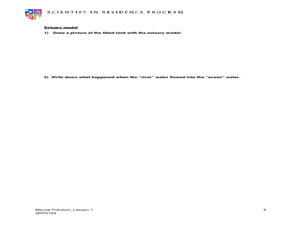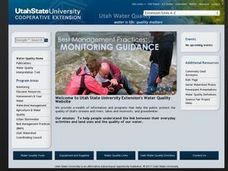University of Waikato
Hubbub Estuary
Estuaries attract people—and that can mean trouble. Learners use video and article resources to learn about the struggles of specific estuaries. They follow their discussion with an analysis of an estuary by identifying possible threats.
Curated OER
Estuary and Watershed
Young scholars investigate the San Francisco Bay Estuarine Research Reserve and watershed. In this estuary and watershed lesson plan, students complete 4 activities to better understand estuarine systems. They include studying the San...
Curated OER
Modeling Estuaries
Students create a model estuary. In this modeling estuaries lesson, students identify characteristics and mix water of varying densities. Students form a hypothesis, conduct an experiment, and analyze the results.
Curated OER
Estuary Interviews
Students role play as newscasters to highlight the lives of estuary animals. In this estuary animal instructional activity, students watch local new shows to examine how interviews take place. They research the lives of animals that live...
Curated OER
Estuaries, Estuarine Habitats, and Adaptations
Students conduct research on estuaries. They design and construct an estuary, describe the physical characteristics of an estuary, and create a diagram illustrating an estuarine food web.
Curated OER
How do pollutants bioaccumulate and biomagnify?
Students review the basic concepts of the food chain. In small groups, they research an organism and create a food web. In addition, they study biomagnifications and write a brief essay or make a poster informing others about the...
Curated OER
Salt Marsh in a Pan
Students create a model of a salt marsh to discover the impact of pollution and human activities on water-based habitats including bays and the ocean. They recognize the relationship between natural and developed areas. Students impact...
Curated OER
Marine & Aquatic Habitats Activities - Estuaries Are for the Birds!
Students recognize that birds act as indicators of pollution because of their sensitivity to environmental change, and role play the manner in which marine debris can be hazardous to waterfowl.
Curated OER
What You Can Do For the Tijuana Estuary
High schoolers discuss how they can be involved in the protection of the Tijuana estuary. In groups, they develop a brochure to share with their community what they can do to save the estuary. They share them with the class and hand them...
Curated OER
Tides in the Hudson
Students view an illustration of the Hudson River watershed and identify the bodies of water shown. They discuss what happens when fresh and salt water mix. Students view a teacher demonstration of the stratification of fresh and salt...
Prince William Network
Migration Headache
During this game, kids become migratory shorebirds and fly among wintering, nesting, and stopover habitats. If they do not arrive at a suitable habitat on time, they do not survive. Catastrophic events are periodically introduced that...
Curated OER
All Hands on Deck: A Harbor Education Program
Students build a model of an estuary. In this wetland lesson, students build a model estuary with a paint tray and modeling clay. They use the model to illustrate the impact of non-point pollution on the watershed.
Curated OER
Surface Water Model
Students examine, through demonstration and experimentation, how water moves through watershed, identify pollutants that can enter water system from different land use activities, and discuss ways people can help prevent water pollution.
Curated OER
Pollution Solutions
Students visit a local park to test the quality of the aquatic environments. They search for sources of pollution and examples of pollution control. Based on their obeservations and experiments, they rate their local environment.
Curated OER
Water Pollution Graphing Activity
Young scholars describe and identify the link between land use activities within a watershed and water quality. They evaluate the quality of a "water sample" ( a bag of skittles), graph their results, and form a hypothesis about the land...
Curated OER
Watershed Awareness
Students investigate the relationship between upstream influences in their watershed and the watershed's estuary. They apply the scientific process to test a hypothesis while examining the impact of upland activities on estuaries.
Curated OER
Caution: Fix It!
Students explore the concept of environmental stewardship. In this science lesson, students investigate events that have harmed coastal resources and how human activity has restored coastal resources.
Georgia Aquarium
The Ocean's Nursery
Linear perspective, estuaries, and water ways converge in a science-inspired art project. The class uses what they've learned about eco-systems, estuaries, and the food chain to create scale models of a local marsh. While the...
Curated OER
Snapshot Day Definitions & Activities
In this watershed worksheet, learners read through related definitions and complete 17 short answer questions about deposition and erosion in the Hudson River.
Curated OER
Water filtration with Plants
Sixth graders explain how soil and plants effect contaminated water in nature. In this filtration lesson, 6th graders work in groups to test biofiltration units. Students determine which biofiltration units work best and how they can...
Curated OER
Environmental Science/Water Pollution
Students study natural habitats, aquatic life, renewable and non-renewable resources. They discuss conservation efforts for sea otters and desert toad in this units.
Curated OER
Design a Service Learning Activity
Students work together to design a service learning activity for their community that would benefit the Tijuana estuary. Using the internet, they research the elements of a service learning project and plan their's accordingly. They...
Prince William Network
The Incredible Journey
Divide your school gym into breeding grounds and non-breeding grounds so that your zoologists can play a game simulating the seasonal migration of shorebirds. Players pick one of the included game cards and follow its directions, which...
Curated OER
These Lakes are Great
Young scholars examine the Great Lakes Basin and water conservation. In this Great Lakes and water activity, students study the location of the lakes before reading the book, The River Ran Wild. They discuss the associated vocabulary and...

























